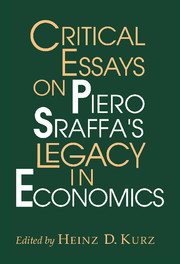Book contents
- Frontmatter
- Contents
- Preface
- List of contributors
- Part I Introduction
- Part II Returns to scale, demand, money and interest, and the classical tradition
- 3 Sraffa's hits and misses
- 4 Sraffa on demand: a textual analysis
- 5 Malthus and the corn–profit model
- 6 The Hayek–Keynes–Sraffa controversy reconsidered
- Part III Long-period theory and the problem of capital
- Part IV Intertemporal equilibrium theory and the problem of capital
- Mathematical Note by Michele Tucci
- Author index
- Subject index
3 - Sraffa's hits and misses
Published online by Cambridge University Press: 05 June 2012
- Frontmatter
- Contents
- Preface
- List of contributors
- Part I Introduction
- Part II Returns to scale, demand, money and interest, and the classical tradition
- 3 Sraffa's hits and misses
- 4 Sraffa on demand: a textual analysis
- 5 Malthus and the corn–profit model
- 6 The Hayek–Keynes–Sraffa controversy reconsidered
- Part III Long-period theory and the problem of capital
- Part IV Intertemporal equilibrium theory and the problem of capital
- Mathematical Note by Michele Tucci
- Author index
- Subject index
Summary
Pressure of other research at first prevented me from responding favourably to the Editor's request for a new paper on Sraffian economics. However, I was glad to have my 1990 revisionist paper included in this colloquium, and did welcome the suggestion that a new Addendum be included. If a scholar in his ninth decade is to record his considered opinions on an important topic, it had better be a matter not of when but of now. So, reconsidering, I do offer here some further informal analyses.
Dr. Samuel Johnson said that being hung in the morning greatly clarifies the mind. Nonsense. It is more likely to paralyze coherent thought. True though that as the days grow shorter, one does dispense with nice diplomacies and ancient jockeyings for victories. Knut Wicksell (1919) at long last wrote out exactly what he faulted and admired in Gustav Cassel's work. To exaggerate a bit, it was a case of then or never, and on a take it or leave it basis posterity is the richer for this.
The one basic novelty
What did I learn from Piero Sraffa's 1960 classic? One thing. An important thing.
Here, too briefly, is that one special thing I learned from Piero Sraffa. In much of this section I quote from my paper in honour of Pierangelo Garegnani (see Samuelson, 1999).
A. Long before 1960 one understood that, in general, no scalar magnitude can denote what is the ‘accumulation of capital’ when a society abstains from present consumption to effectuate a permanent rise in potential future consumption.
- Type
- Chapter
- Information
- Critical Essays on Piero Sraffa's Legacy in Economics , pp. 111 - 180Publisher: Cambridge University PressPrint publication year: 2000
- 11
- Cited by



